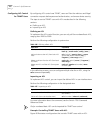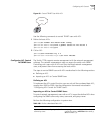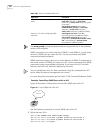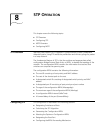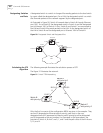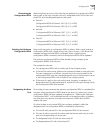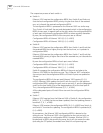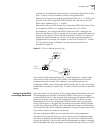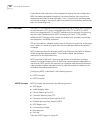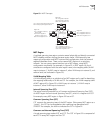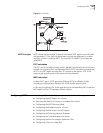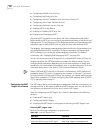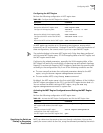
184 CHAPTER 8: STP OPERATION
The comparison process of each switch is:
■ Switch A
Ethernet 1/0/1 receives the configuration BPDU from Switch B and finds out
that the local configuration BPDU priority is higher than that of the received
one, so it discards the received configuration BPDU.
The configuration BPDU is processed on the Ethernet 1/0/2 in a similar way.
Thus, Switch A finds itself the root and designated switch in the configuration
BPDU of every port; it regards itself as the root, retains the configuration BPDU
of each port and transmits configuration BPDU to others regularly thereafter.
By now, the configuration BPDUs of the two ports are as follows:
Configuration BPDU of Ethernet 1/0/1: {0, 0, 0, e1/0/1}
Configuration BPDU of Ethernet 1/0/2: {0, 0, 0, e1/0/2}
■ Switch B
Ethernet 1/0/7 receives the configuration BPDU from Switch A and finds that
the received BPDU has a higher priority than the local one, so it updates its
configuration BPDU.
Ethernet 1/0/4 receives the configuration BPDU from Switch C and finds that
the local BPDU priority is higher than that of the received one, so it discards the
received BPDU.
By now the configuration BPDUs of each port are as follows:
Configuration BPDU of Ethernet 1/0/7: {0, 0, 0, e1/0/1}
Configuration BPDU of Ethernet 1/0/4: {1, 0, 1, e1/0/4}
Switch B compares the configuration BPDUs of the ports and selects the
Ethernet 1/0/7 BPDU as the optimum one. Thus, Ethernet 1/0/7 is elected as
the root port and the configuration BPDUs of Switch B ports are updated as
follows.
The configuration BPDU of the root port Ethernet 1/0/7 remains {0, 0, 0,
e1/0/1}. Ethernet 1/0/4 updates the root ID with the root ID in the optimum
configuration BPDU, updates the path cost to root with 5, sets the designated
switch as the local switch ID and the designated port ID as the local port ID.
Thus, the configuration BPDU becomes {0, 5, 1, e1/0/4}.
All the designated ports of Switch B then transmit the configuration BPDUs
regularly.
■ Switch C
Ethernet 1/0/1 receives from the Ethernet 1/0/4 of Switch B, the configuration
BPDU {1, 0, 1, e1/0/4} that has not been updated, then the updating process is
launched. {1, 0, 1, e1/0/4}.
Ethernet 1/0/5 receives the configuration BPDU {0, 0, 0, e1/0/2} from Switch A,
and Switch C launches the updating. The configuration BPDU is updated as {0,
0, 0, e1/0/2}.
By comparison, the Ethernet 1/0/5 configuration BPDU is elected as the
optimum one. The Ethernet 1/0/5 is thus specified as the root port with no
modifications made on its configuration BPDU. However, Ethernet 1/0/1 is
blocked and its BPDU also remains the same, but it will not receive the data
(excluding the STP packet) forwarded from Switch B until spanning tree



